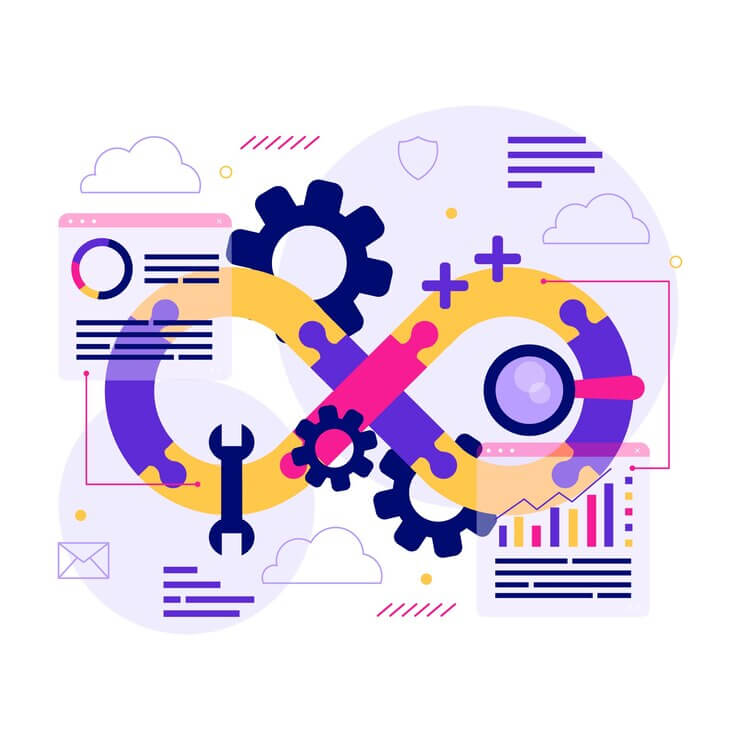DevOps, a methodology that emphasizes communication and collaboration between software development and IT operations teams to deliver high-quality software faster. Its significance lies in streamlining processes, increasing deployment frequency, and fostering a culture of continuous improvement. The technology landscape is evolving rapidly, driven by innovations like cloud computing, artificial intelligence, and the Internet of Things. These advancements present opportunities and challenges for organizations seeking to adopt DevOps practices to stay competitive in a dynamic market.
This blog explores the prospects of DevOps in light of the evolving technology landscape, examining emerging trends, evolving practices, and the role of DevOps in driving digital transformation.
The future of DevOps is promising as organizations increasingly prioritize agility and efficiency in software development and IT operations. Pursuing a DevOps certification can significantly boost one’s career prospects in this sector by demonstrating expertise in implementing DevOps practices and tools. Such certification validates skills like continuous integration/deployment (CI/CD), infrastructure automation, and collaboration. With the demand for DevOps professionals on the rise, certification enhances credibility. It opens doors to diverse job opportunities across industries, making it a strategic investment for individuals aspiring to thrive in the evolving DevOps landscape.
What is DevOps?
DevOps is a methodology that fosters collaboration between software development and IT operations teams to streamline the software delivery process. It also emphasizes automation, continuous integration, and continuous delivery to achieve faster and more reliable deployment of applications. By breaking down the silos between development
and operations, DevOps enables teams to deliver high-quality software with greater speed and efficiency. This approach typically promotes a culture of continuous improvement, driving innovation and agility within organizations to meet the demands of today’s rapidly evolving digital landscape.
Current State of DevOps
DevOps practices have seen widespread adoption across industries, with organizations integrating automation, collaboration, and continuous delivery into their software development and IT operations processes. This adoption has improved efficiency, faster time-to-market, and enhanced team collaboration.
The key benefits of DevOps include accelerated software delivery, increased productivity, and enhanced reliability of systems. However, organizations also face challenges such as cultural resistance to change, complexity in tooling, and the need to upskill the existing workforce to adapt to DevOps practices.
Recent trends in DevOps include the rise of DevSecOps integrating security into the DevOps pipeline, the adoption of containerization and microservices architecture, and the emergence of serverless computing. Additionally, advancements in DevOps tools such as Kubernetes, Docker, and CI/CD pipelines have further streamlined the software
development and deployment processes.
Emerging Trends in DevOps
Exploring emerging technologies like Kubernetes and Serverless computing is reshaping DevOps practices. Kubernetes, an open-source container orchestration platform, enables efficient deployment and management of containerized applications, while Serverless computing abstracts infrastructure management, allowing developers to focus solely on code execution.
Industry shifts towards DevSecOps and GitOps reflect a growing emphasis on integrating security and version control into DevOps workflows. DevSecOps integrates security throughout the software development lifecycle, ensuring that security
considerations are addressed immediately. GitOps leverages Git repositories as a single source of truth for infrastructure and application deployments, promoting version control and automation.
Integrating AI/ML in DevOps processes is revolutionizing automation and optimization efforts. AI/ML technologies enable predictive analytics, anomaly detection, and intelligent automation, enhancing efficiency and reliability in continuous integration, deployment, and monitoring tasks. This integration empowers DevOps teams to make data-driven decisions and proactively address issues, optimizing software delivery pipelines and improving overall system performance.
Evolving Practices and Strategies
Evolving DevOps practices like DevOps 2.0 and DevOps as a Service (DaaS) are redefining the DevOps landscape. DevOps 2.0 emphasizes scalability, automation, and cloud-native architectures, facilitating more efficient and adaptable development and deployment processes. Meanwhile, DevOps as a Service (DaaS) provides organizations with cloud-based DevOps tools and platforms, enabling streamlined collaboration, resource optimization, and scalability without the need for extensive infrastructure investments.
Case studies offer valuable insights into real-world DevOps implementations and success stories. These examples showcase the tangible benefits of adopting DevOps methodologies, such as accelerated delivery timelines, improved product quality, and enhanced customer satisfaction. By highlighting specific challenges, strategies, and outcomes, case studies provide actionable lessons for organizations seeking to implement or optimize their DevOps practices.
Achieving DevOps maturity requires significant cultural and organizational transformations. This involves fostering a collaborative and agile culture, breaking down silos between development and operations teams, and promoting transparency, accountability, and continuous learning. By embracing DevOps principles and practices at all levels of the organization, companies can cultivate an environment conducive to innovation, agility, and sustained growth in the rapidly evolving technology landscape.
Predictions for DevOps in 2024 and Beyond
DevOps adoption is expected to continue growing steadily, with more organizations embracing its principles and practices to enhance agility, collaboration, and efficiency in software development and delivery processes. As DevOps matures, there will be a greater emphasis on integrating security, compliance, and governance into DevOps workflows to address evolving regulatory requirements and cybersecurity threats.
Potential disruptive technologies such as artificial intelligence/machine learning (AI/ML), edge computing, and quantum computing are poised to impact DevOps practices significantly. These technologies will enable automation, predictive analytics, and intelligent decision-making, revolutionizing how software is developed, deployed, and managed.
DevOps will remain a driving force behind innovation and digital transformation across industries, empowering organizations to respond rapidly to market changes, deliver value to customers more effectively, and stay ahead of the competition. By fostering a culture of collaboration, experimentation, and continuous improvement, DevOps will
continue to drive organizational success in the increasingly competitive and dynamic business landscape.
Conclusion
The future of DevOps in 2024 and beyond appears promising, with continued growth, innovation, and impact across industries. Embracing DevOps principles and practices will be essential for organizations striving to remain competitive in the rapidly evolving digital landscape. Moreover, investing in a DevOps certification can significantly enhance career prospects in this dynamic field. By acquiring recognized credentials, professionals demonstrate their expertise in DevOps methodologies, tools, and practices, positioning themselves as invaluable assets to organizations seeking to drive innovation, streamline operations, and deliver value to customers efficiently in the era of continuous digital transformation.







